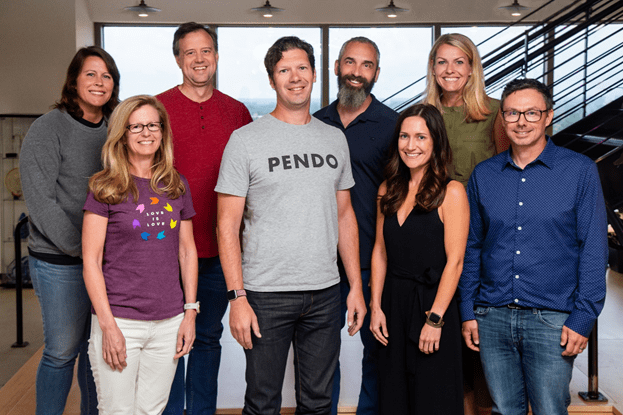

By Karly Wentz
Over the past decade, companies across all industries have needed to embrace technology to remain competitive. Simply put, every company is now a tech company. Digital solutions have spread across all functions within enterprises, and have been a core tenet of our Future of Work thesis, as we continue to partner with leading software platforms that support core functions, including RevOps (Clari) and HR (Phenom People). With the rise and adoption of digital products, we have seen an exponential increase in complexity. This is seen both in how products are purchased and deployed, and in the challenge of leveraging massive amounts of product and usage data to deliver personalized and contextual end-user experiences.
Product management teams often shoulder this load. Product managers (PMs) are in a unique position to create value, uniting several departments and functions in one core discipline and leveraging data-driven experiments to decide future product direction and measure continuous delivery of user value. PMs have been gaining in stature within technology companies as they become “product-led,” with executives seeing product as an engine to drive revenue and growth. This trend has spread beyond tech into more traditional industries as they shift to digital. Demonstrating this, Chief Product Officer is one of the fastest growing titles on LinkedIn, jumping 41 percent over the last three years.
Driven by these tailwinds, the overall market for product management software solutions is expected to grow to over $80 billion by 2024. Product teams require specific software tools to continue to meet the high bar demanded by their customers. These tools broadly fall into two categories: 1) understanding customers, their specific needs and pain points and what drives higher customer value, and 2) acting on those insights, guiding users to higher value activities and improving performance. These solutions allow PMs to optimize products and drive significant value, including through increased user adoption, stronger engagement, and higher retention.
This is why we are thrilled to announce our investment in Pendo, a platform that accelerates and deepens software product adoptions. Pendo has been recognized as the all-in-one solution for product teams and customer success/support teams by combining product usage analytics with user guidance, communication, feedback, and planning tools. These solutions enable companies to measure and elevate their customer experiences as well as drive higher net retention and revenue expansion opportunities. We’re also excited about Pendo’s opportunity in the digital adoption space. With the rise of distributed work comes the challenge of onboarding and training remote employees. Pendo helps IT and HR teams drive adoption of employee and customer facing software.

We have been tracking Pendo for a few years, watching it become the best-of-breed solution it is today. The company has received several accolades, including rankings on the Forbes 2020 Cloud 100 list three years in a row; and ranking #26 on the Inc. 5000 last July. It is a top ranked product for both Product Analytics and Digital Adoption on G2. It is clear customers love Pendo. This has allowed the company to scale rapidly and surpass $100M in annual recurring revenue with top tier performance metrics and over 2000 enterprise customers across multiple industries. Customers include Morgan Stanley, Discovery Education, Carta, IQVIA, Coursera, Okta, Citrix, Salesforce, Zendesk, among several others.
Pendo is well positioned for its next phase of growth with several key channels for future expansion. The company has a robust roadmap expanding into additional tools and functionality as it continues in its mission to support PMs. This expansion includes Pendo’s latest Digital Adoption Solutions product offering, extending its current capabilities into the employee-facing software market. Just as product adoption drives value for customer-facing applications, accelerating the adoption of internal software is key to achieving ROI as well. We believe this will effectively double the company’s addressable market.
Pendo has successfully acquired enterprise customers across a variety of industry segments by driving value for customers in sectors beyond technology, including healthcare, education, and financial services, as well as internationally. Pendo already has a robust international presence in six countries including Japan, UK, and Israel. Importantly, Pendo’s business model is directly indexed to growth in software — as software continues to proliferate, so does Pendo.
After meeting Todd Olson, Erik Troan and the Pendo management team, we quickly learned that Pendo’s impressive performance has been driven by its equally impressive team. Todd is a successful serial entrepreneur with deep technical and product expertise. He has founded companies such as Cerebellum Software and 6th Sense Software (acquired by Rally Software) and has first-hand product operating experience by being in senior product roles himself. Erik also has deep product and technical expertise. He spent eight years at RedHat in VP Product Engineering and Chief Developer roles, and was cofounder and CTO at rPath (acquired by SAS). Todd has also built a phenomenal executive team: Jennifer Brannigan, Chief Revenue Officer at Pendo, leads GTM strategy and previously led sales at Glint/LinkedIn and NBC. Tatyana Mamut leads new products and is a former CPO at Nextdoor and VP Products at Salesforce and Amazon; and Jennifer Kaelin is Pendo’s Chief Financial Officer, having previously been a CFO at SciQuest.
At B Capital, we look to partner with and invest in industry leaders that drive real value for their customers. Pendo fits that profile perfectly. As global investors in enterprise software, we look forward to partnering with Pendo in this next phase of growth and support them on their mission to elevate the world’s experiences with software.